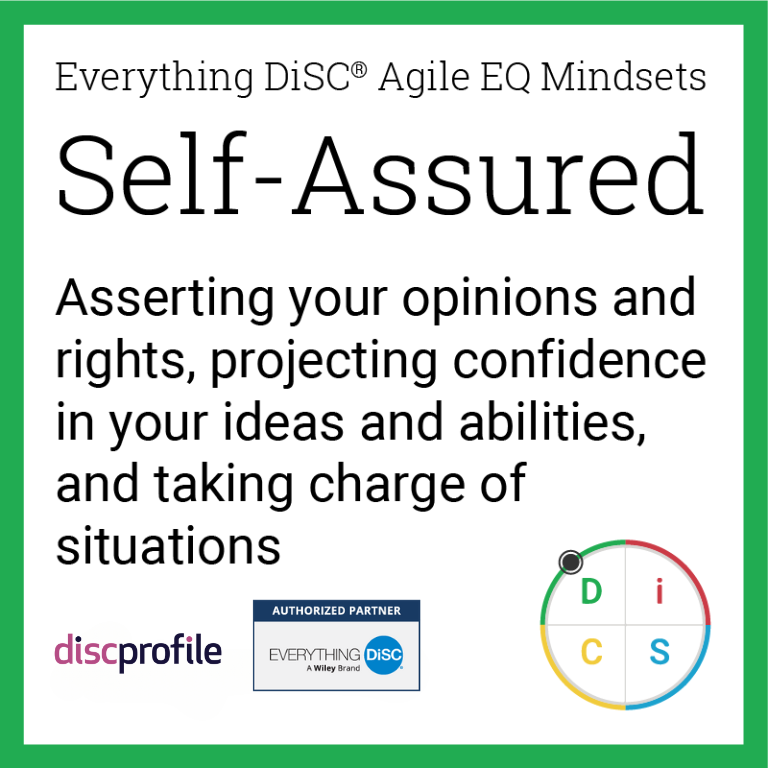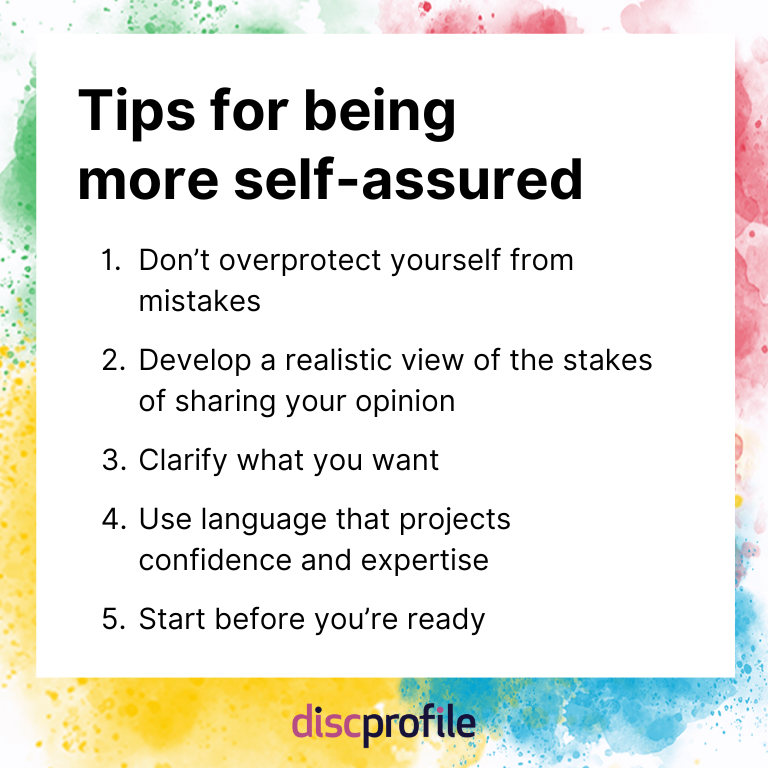How to Be More Self-Assured

If you are not a naturally self-assured person, this quality may feel elusive to you. How can other people speak out so confidently, even when no one else agrees? Where does their courage come from? Why aren’t they as phased by setbacks? With practice, you can learn how to be more self-assured, even if it doesn't come naturally to you.
Key Takeaways
- People with self-assured personalities project confidence and don't hesitate to take charge.
- People of all personality types may want to call upon the self-assured mindset when they need to make their needs known, signal conviction, or lead a team.
- You can practice being more self-assured by being OK with making mistakes, using language that projects confidence, and taking charge even if you don't feel like an expert, among other tips.
All people have some mindsets that come naturally, and some that take more effort to tap into. No one mindset is better than another, or more indicative of emotional intelligence. Rather, all tendencies are valuable at different times, depending on the demands of the situation at hand.
Self-assured meaning
“I don’t hesitate to take charge.”
Self-assured people are direct and firm communicators who project confidence (even when they don’t feel it). You can count on them to say what they mean and mean what they say. These assertive folks tend to spend less energy than most worrying about ruffling feathers.
Self-assured people often step up to take the lead, even when they’re not officially in charge. Instead of asking what to do, they create a plan and take action. For them, making a mistake isn’t the end of the world. A mistake is a small price to pay for the rewards of going all in and sharing all they have to offer.
Self-assured is one of the eight mindsets described in Everything DiSC® Agile EQ™. It tends to align with DiSC D styles.
Everything DiSC Agile EQ
Why are some people more self-assured?
People are naturally self-assured for a variety of reasons, depending on their DiSC styles and life experiences. People with the self-assured mindset often act that way because they need:
- self-determination
- influence
- to control outcomes
- to shape things to their vision
- to set their own course, free from others’ influence
- to make their voices heard
Benefits of a self-assured mindset
Whether it’s easy for you or not, operating from the self-assured mindset can allow you to:
- inspire confidence in your skills and ideas
- ensure that others take what you say seriously
- insist that your rights and ideas are respected
- convey to others your conviction in your opinions
- communicate your expertise
- bring candor to situations that benefit from straight talk
- make sure your ideas don’t get overlooked

Situations that may call for self-confidence
In many settings, people don’t take you seriously unless you project confidence in your own ideas and abilities. This is true even if you’re second-guessing yourself on the inside.
When you downplay your ideas or speak tentatively, it can come across like you’re doubting yourself. This is an invitation for others to doubt you as well. Practicing the self-assured mindset is a good way to give your ideas a fighting chance.
The self-assured mindset is useful when you just need to get things done. You also might need to be more self-assured when:
- making your needs known
- leading a team or project
- inspiring a sense of confidence in your abilities
- making a case for a course of action
- signaling your conviction in an idea or belief
Limitations of a self-assured mindset
Like all Agile EQ mindsets, self-assuredness can become limiting with overuse. If you get stuck in this mindset, you could:
- make other people feel intimidated or wonder if you like them
- prevent more reserved colleagues from speaking up with critical information
- view your interactions as a battle for control
- be so confident in your perspective that you don’t consider other views
- take control in situations where power is meant to be shared
- steamroll over other people’s rights and needs, leading to frustration and resentment
Understand why it’s hard for you to be more self-assured
Recognize your thoughts
The ways to practice the self-assured mindset will be different for people of different DiSC styles. That’s because everyone is driven by different automatic thoughts that subconsciously direct their choices and behaviors.
Being more self-assured may mean pushing against thoughts such as:
- It’s OK if I don’t get what I want.
- It’s safer to keep a low profile.
- It’s arrogant to assume I know best.
- I want to do what’s best for the team.
- I don’t want to be a burden.
Set goals
Once you recognize these thoughts, you can be more intentional about setting goals to boost your confidence. The Agile EQ profile (see sample) presents beginner, intermediate, and advanced goals for each learner. Some example goals for being more self-assured are:
- I’m comfortable questioning ideas or policies that don’t make sense to me.
- I tend to state my opinions firmly and confidently, even if I know they will be unpopular.
- I’m OK being a little blunt with a colleague every once in a while.
- I push back if I think I’m handling a bigger workload than is fair.
- I typically take on leadership opportunities when they present themselves.
5 tips for becoming more self-assured
People with different styles will approach these goals in their own ways. But in general, you can become more self-assured by: gaining comfort with mistakes, being clear about what you want, using confident language, and taking charge even when you don't feel like an expert.
1. Don’t overprotect yourself from mistakes. You might be wrong. It’s OK.
Being self-assured doesn't mean you're always right. Self-assurance is more about being resilient in the face of uncertainty and mistakes. Overprotecting yourself from failure—whether by avoiding risk, second-guessing every move, or staying silent to avoid critique—can undermine your confidence.
Tennis icon Billie Jean King talks about relabeling mistakes as feedback. In this video, she describes how, if she hits a ball out, she makes the correction in her mind. Then she presses “enter” on the lesson and presses “delete” on the mistake.
When you have a growth mindset, you know that setbacks are part of the process—not signs that you're inadequate. Viewing mistakes as learning opportunities leads you to perform better and feel more confident over time.
Read more about how mistakes breed confidence: How to Make More Mistakes
2. Develop a realistic view of the stakes of sharing your opinion
It’s easy to catastrophize what might happen if we speak up at work. Will we be remembered forever for that bad idea? In reality, most opinions shared in meetings are quickly forgotten unless they add meaningful value—and if they do, they’re often appreciated.
Research in organizational behavior has found that people tend to overestimate how harshly others will judge them for speaking up. This is one aspect of a cognitive bias known as the spotlight effect. Basically, we think people are always paying more attention to us than they are. We see ourselves as “in the spotlight” whenever we're around others.
But because everyone else is focusing on their perceived spotlight, they're not devoting their energy to logging and judging your behavior. Understanding this helps you put things in perspective. Sharing your thoughts isn’t a high-stakes gamble—it’s a normal part of workplace dialogue.
The spotlight effect makes us self-conscious. It convinces us to pass up opportunities. It tells us not to try new things because we might look silly. Later, we regret the things we didn't do or say out of fear of judgment. The reality is that we greatly exaggerate how much people notice our mistakes.
3. Clarify what you want
Clarity is a cornerstone of self-assurance. When you're uncertain about your goals, values, or priorities, it's difficult to make decisions confidently or advocate for yourself. But when you know what you want, you become more decisive and grounded. This clarity allows you to communicate with conviction and resist being swayed by external pressures that don't align with your goals.
It would be nice if clarity always came all at once, like the proverbial lightning flash. But in reality, it may be something you seek with deliberation. If you're feeling a lack of clarity about what you want, here are some questions to ask.
To understand your core values:
- When have I felt most proud of myself?
- What qualities do I admire in others?
- What makes me feel fulfilled, even without external rewards?
To understand your personal definition of success:
- If no one else’s opinion mattered, what would I pursue?
- What am I doing when I feel most “in flow” or alive?
- How do I define “a good life”?
To understand what you don't want:
- What drains my energy or makes me feel small?
- What patterns or environments have consistently made me unhappy?
- What am I afraid of repeating?
To understand what goals to set:
- What do I want to be known for?
- What kind of hard work feels worth it to me?
- What kind of growth would excite me—even if it's a little scary?
4. Use language that projects confidence and expertise
Your words shape how others perceive you—and how you perceive yourself. Language that’s filled with hedges (“I think,” “maybe,” “I’m not sure, but…”) can undercut your authority, even when your ideas are solid.
Start by cutting unnecessary qualifiers and speaking in complete, declarative sentences. Practice replacing tentative phrases with confident ones. For example, try “I suggest…” instead of “I was wondering if maybe…” Over time, this shift not only changes how others respond to you, but also reinforces your own self-belief.
5. Take charge even if you don’t feel like an expert
Confidence doesn’t always come from competence. (I'm sure you can think of many confident people who don't know what they're doing.)
The fact is that sometimes the confidence comes first. Taking initiative before you feel 100% ready helps you develop the very expertise you’re waiting on to feel confident.
You may have heard the advice to “start before you're ready.” Like most advice, this can be taken too far. But if you're someone who is not naturally self-assured, it's good to attempt this at least occasionally.
If you wait to be the most knowledgeable person in the room before stepping up, you’ll often miss your moment. Instead, trust your ability to figure things out along the way.
Taking charge doesn't mean “command and control.” A big part of stepping into informal leadership involves listening and building relationships. Ask questions, make informed decisions, and learn from the process.
Taking charge shows that you believe in your potential—and that belief is contagious.

If you are not a naturally self-assured person, you’ll likely feel discomfort as you begin this work. You’ll probably make mistakes. If you do, congratulations! You’re learning and building a new skill.
Have you ever started lifting weights after not exercising for a while? Your muscles ache. You are frustrated at not being stronger and dispirited at the long road ahead. But if you do just a little bit, most days, you start to see progress. Your body responds to what you are asking of it, and you build new habits.
Emotional intelligence is a skill, and as such, it improves with practice. The research shows that anyone can develop agility and EQ, no matter their starting point. Once you begin, it’s quite empowering to realize all the options available to you in a given situation—to know that your natural reaction is not your only choice.
Posted 08/05/2020, Last Updated 04/23/2025







